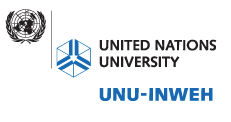It is possible to close "the gap between promise and practice" in management global water resources, with enabling environments to finance and implement the Sustainable Development Goals (SDGs), according to a report by the UN Office for Sustainable Development (UNOSD) and the UN University Institute for Water, Environment and Health (UNU-INWEH).
The report explores the role that water, including sanitation and wastewater management, plays in sustainable development, discusses "disconnects" between the proposed SDGs and national development plans, and highlights opportunities for achieving sustainable development through water management.
 March 2015: It is possible to close “the gap between promise and practice” in management global water resources, with enabling environments to finance and implement the Sustainable Development Goals (SDGs), according to a report by the UN Office for Sustainable Development (UNOSD) and the UN University Institute for Water, Environment and Health (UNU-INWEH). The report explores the role that water, including sanitation and wastewater management, plays in sustainable development, discusses “disconnects” between the proposed SDGs and national development plans, and highlights opportunities for achieving sustainable development through water management.
March 2015: It is possible to close “the gap between promise and practice” in management global water resources, with enabling environments to finance and implement the Sustainable Development Goals (SDGs), according to a report by the UN Office for Sustainable Development (UNOSD) and the UN University Institute for Water, Environment and Health (UNU-INWEH). The report explores the role that water, including sanitation and wastewater management, plays in sustainable development, discusses “disconnects” between the proposed SDGs and national development plans, and highlights opportunities for achieving sustainable development through water management.
‘Water in the World We Want: Catalyzing National Water-Related Sustainable Development’ draws on ten country case studies: Bangladesh; Bolivia; Canada; Indonesia; Pakistan; the Republic of Korea; Singapore; Uganda; Viet Nam; and Zambia. The case studies underscore, inter alia: differences between country priorities for development and the proposed SDGs; information gaps between anticipated costs and financing mechanisms; and the importance of matching the SDG targets with human, financial, institutional and technical capacity.
“The global water crisis is not that there isn’t enough water on Earth to meet all needs; it is a crisis of there not being enough water where we want it, when we want it, of sufficient quality to meet these needs,” declares the report. In the absence of improved water governance and effective management of drinking water and sanitation, the report cautions, sustained water shortages will lead to intra-community and inter-sector competition and water conflict.
The report recommends that governments commit to: universal access to water, sanitation and hygiene (WASH); and timely, transparent monitoring and reporting on SDG indicators. It also recommends that national governments: prioritize sustainable advancements in water, sanitation and wastewater management through independent water agencies; balance supply and demand at the sub-basin level to ensure disaster risk reduction (DRR) and sustainability and to protect downstream users; and identify new and emerging financial resources. Noting that corruption in the water sector can amount to 30% of expenditures, the report calls for clear, defined anti-corruption protocols.
The report further recommends, inter alia: incorporating DRR targets in the post-2015 water and sanitation-related SDGs; holding the agriculture and energy sectors accountable for water use efficiencies and ensuring that sector activities do not compromise water quality; and promoting capacity building at all levels.
UNOSD and UNU-INWEH launched the report at the Capacity Development Workshop in Advancing Water and Sustainable Development, which convened in New York, US, on 24 February 2015. [UN Press Release] [Publication: Water in the World We Want: Catalyzing National Water-Related Sustainable Development] [IISD RS Story on Workshop]